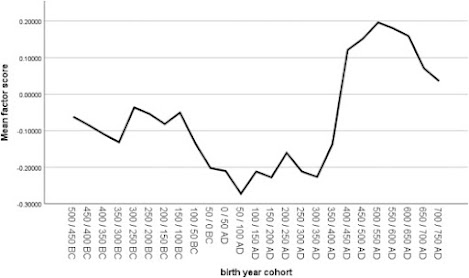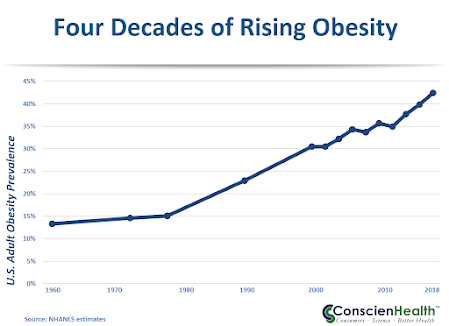The portrait of Larthia Seianti, Etruscan noblewoman, on her sarcophagus. She died probably during the 2nd century AD. As you can see, she was not exactly thin, you may even say that she was a little overweight. But, surely, she was not obese. The ancient Romans just didn't seem to have the obesity problem that plagues us nowadays. Yet, they had plenty of health problems. In this discussion, I argue that the moment of maximum growth of a civilization may correspond to the lowest level of health for its population and that, in our case, the obesity epidemic is a symptom of our global health crisis. Such is the law of the Seneca Cliff!
Surprisingly, I found that as we collapse our health may well improve -- at least for those who survive. It is a chain of thoughts that comes from a comparison with the case of the Roman Empire that, as usual, provides us with a roadmap for what we can expect for the future. But let me go in order.
The health problems associated with the decline of the Western society are often dismissed because "the life expectancy keeps increasing." That has been true up to recent times, although the Covid pandemic may signal a reversal of the trend. But life expectancy is just one of the many parameters that define human health. What, I think, is an indicator that something is badly wrong in the Western World is the epidemics of obesity.
You'll find, below, a post that I published on my "The Proud Holobionts" blog that summarizes some recent research on obesity. Basically, it seems that the main element causing it is added sugar in industrially processed food, although this is not by any means the only one.
How is the fact that the food industry puts extra sugar in their products related with the decline of our civilization? It is, in my opinion, because all the economic actors strive to maintain their profits even though the economy is declining. One way to do that is to reduce the quality of the products while maintaining their appearance and their price. So, the food industry tends to add a cheap ingredient (sugar) to almost everything. The added bonus is that, if sugar makes people fatter, they will eat more, and the industry will make more money. It is, in the end, our tendency to monetize everything that is leading us to our doom.
So, did the Ancient Romans have an obesity problem during their decline? For one thing, the term "obese" comes from the Latin "obesus," with the same meaning as today. The Romans knew what obesity is, but they tended to consider it as an attribute of other peoples or of depraved persons. Livy spoke of the obesus etruscus ('fat Etruscan') as an insult to a people he considered lazy and decadent.
We have some images from Roman times that show fat people. At least one emperor, Vitellius (15- 69 CE) (see the image here) was often represented, and derided, as fat and corpulent. Even Lucius Annaeus Seneca, who inspired the title of this blog, seems to have been overweight in old age. Yet, we have hundreds, perhaps thousands, of portraits of Ancient Romans, and very few are fat. Obesity just didn't seem to be a problem for the Romans: that seems to make sense: they didn't have our industrially processed food.
Yet, the Ancient Romans did have health problems. There is a fascinating study by Jongman et al., that reports this graph:
Here, the "Mean Factor Score" is a measure of the overall health of the Romans, as determined by their skeletons. Note how it reaches a minimum around the mid 1st century AD. This is amazing, because that was supposed to be the moment of maximum splendor for the Roman Empire! Yet, despite the moment of glory and of wealth, the Romans were sick of various ailments that stunted their growth and deformed their bones -- we can still see that in their skeletons. Poor diet, pollution, crowded towns, bad hygienic conditions, metal pollution, and the like.
Even more amazing is how the health of the people improved as the empire went through its death throes. It makes sense: the population went down, and the survivors could enjoy a healthier lifestyle, eat a better diet, and suffer less from pollution. They actually had to be lean and fit if they wanted to survive.
If we translate these considerations to our times, then it may well be that the obesity epidemic is a transient phenomenon of the "peak wealth" of our civilization: the result of a combination of pollution, stress, poor diet, crowding, etc., just like in Roman times. As we go down the Seneca curve, we'll be thin again. It will not be painless, though!
Saturday, May 21, 2022
by Ugo Bardi
The obesity epidemic keeps expanding. The above are, I believe, the most recent data available for the US. The COVID-19 lockdowns and isolation measures are reported to have made things even worse. This trend is simply horrendous: what the heck is happening to humankind? (Disclaimer: I am not a nutritionist, I am just someone who is fascinated by data and trends. And, of course, we are all interested in our health! Here, I report some data I found, hoping you may find them useful. Don't take them as the last word on the subject. As always, before acting on things that affect your health, do your own search and use your judgment about what works for you.)
The obesity epidemics had a considerable boost by the lockdowns during the Covid-19 pandemic. Coupled with the opposite effect, that obesity is a risk factor for people who contract Covid, you have a remarkable disaster in the making. With several Western countries having percentages of obese people close to or higher than 50%, one wonders what's going to happen in the future. Why are the human holobionts in such a poor shape?
First, the work by Raubenheimer and Simpson on the food preference of various animals. It is summarized in a recent book titled, "Eat like the Animals." (Mariner Books, 2021). Their discovery is easy to summarize: it seems that most living beings have a specific set point in their needs for the main nutrients. They seek a specific balance among proteins, fats, and carbohydrates. In particular, they aim at a minimum intake of protein. If animals are fed an unbalanced diet, for instance, poor in protein, they will tend to eat more food until they reach the right level. Raubenheimer and Simpson call this the "protein leverage hypothesis:"
The story is complicated, and I don't pretend to say anything new. I just want to attract your attention to some recent studies that I think shed some light on the mechanism of human obesity (but even our fellow dog holobionts are suffering from obesity).
"In a protein-poor but energy-rich food environment, humans will overeat carbs and fats to try to reach their protein target. However, when the only available diet is rich in protein, human will underconsume carbs and fats"
Since excess carbohydrates are stored in the body as fat, we can say that one of the causes of the obesity pandemic is that the human diet in Western countries is overstocked in carbohydrates.
Here comes Robert Lustig and his book "Metabolical" (Yellow Kite 2021) where he minces no words on how this is not only true but also a profitable strategy for the food industry. They discovered long ago that if they put more and more carbohydrates (sugars) in the food they sell, then people will get fat, they will eat more, and that will increase their profits. Just like sick people are a boon for medical doctors, obese people are a boon for food producers.
You don't believe that? Let me show you a picture I took a few days ago in an Italian supermarket:
There are four kinds of regular mayonnaise on sale, plus a fancy one with no eggs. Can you guess which is the only one that does not contain added carbohydrates? Let me tell you, it is the most expensive one among the regular ones. All the others contain sugar. Maybe it is not the same for all mayonnaise brands on the market, but I think it is significant. Food companies do add sugar everywhere, even when it is not called for by the traditional recipes. They deny that, but it is written on the list of the ingredients (I have pictures, if you don't believe me!)
Now, it may well be that there is much more to obesity than just carbohydrates, but I think that these results point at an important cause of the problem. There are data showing that what we are seeing may be a delayed effect of "peak sugar" that occurred around the year 2000. From then on, the amount of sugar consumed in the U.S. has been going slightly down. But it remains high.
The beauty of this is that, if it is true, with obesity we don't have such a wicked problem as others, say, global warming. We know that to avoid global warming, we should stop burning hydrocarbons, but it is also true that we can't just stop: billions of people would die. But we could stop, or at least strongly reduce, the extra carbohydrates added to processed food, and we could do it today. Nobody would die, but the problem would be eased and many people would be healthier! But this is the way things are in the world: no problem can ever be solved when there is somebody making money if it remains unsolved.
To make you happier, let me show you some data that tell us that a little excess weight (a little!) is not necessarily bad for your organism. Here are some data from Malcolm Kendrick's wonderful book "The Clot Thickens" (Columbus 2021).
BMI stands for "Body Mass Index" and the overall lowest risk of death is for a BMI of 25-30 that's normally classified as "overweight" (if you want to know, I am at BMI=27). Being underweight is a larger risk than being obese! But obesity has many other problems, not least in terms of self-esteem.
In the end, remember that you are a holobiont and that for hundreds of millions of years your holobiont ancestors never ate anything that was processed in an industrial plant. You are a fine-tuned machine that includes trillions of friendly viruses and bacteria living in your guts. They want a balanced diet of fats, protein, fiber, and not too much in terms of carbohydrates (but you need them, too!). Try to make them happy, and you'll be happier, too!










An explosion of monetised contents on the web has started to become a trend - filming people race and eating enormous intakes of food - to make a living.
ReplyDeleteWatch here a sample with 1+ million views...
Here is a TV report from the Middle East explaining to viewers how Europe has started to smuggle into itself - banned Russian Oil.
The smuggled Russian, Iraqi, Syrian, Yeminis, Libyan's oil on the international black energy market (Iraq was selling oil to escape sanctions in the 1990s for few dollars a barrel) - is then used to power processes that run the digital platforms 24/7 - propagating the inhumanely intakes of food contents.
This is all - no less than a sponsored and forced Seneca Curve - to a plan - rather than anything natural;
"In any system of energy, Control is what consumes energy the most".
Wailing.
Billionaires are getting fat too from higher prices
ReplyDeletehttps://www.theguardian.com/news/2022/may/23/food-and-energy-billionaires-453bn-richer-oxfam-davos-wealth-tax-soaring-prices
Ah no, I checked my aldi mayonaise, theres sugar in it. A curse of jaysus on it anyway. Having a child with T1 diabetes, I usually check all labels for carbs at least. Theres 3.4grms of carb in 100ml, really there should be only a trace as mayo is really just egg and oil.
Is it time I make my own?
You keep discovering new things in life.....
DeleteWe do not need carbohydrates apparently. The human body needs small amounts, and it also needs to do something with all those glycerol backbones of tryglycerides, after they are used to transport fats to where they are burned. The body usually recycles glycerol by turning it into glucose, and it is more than enough. Likewise fiber is not needed.
ReplyDeleteUgo: I tend toward being fat. As we say here in America, I like my vittles. But for the past month or so I have started controlling how I eat.
ReplyDeleteNo, I am not on a fancy diet, I just prepare food myself and cut out "convenient calories". That is my term for industrialized junk food of all types. I did it because I sense a bad harvest and short food supplies and a need to cook yourself because "convenient calories" are going up in price faster than the raw ingredients needed to cook for oneself.
All the fancy talk and the bullshit nutritional needs that are posited by researchers whose "results" are directly related to source of funding can be ignored.
Just get used to cooking simple cheap food for yourself. Walk more. You'll get healthy. So I suppose your discussion point of "obesity epidemic" will become less an issue. It was always just a phase.
I read this earlier, but I just had to come back to it, because it's too funny. The idea of society collapsing and us wondering about whether we will be obese when we will probably be starving to death is quite a juxtaposition. I'm wondering if people will try to eat my dogs, or kill me for my food...were cannibals ever obese? Hmmmmm....if the industrial food/farming complexes break down, and if people can't order pizza and Pepsi on What'sapp (or buy things in stores), the obesity matter will be the least of our worries!!!
ReplyDeleteC.
Two very good data sources and many studies exist relative impacts of a major change in diet when calories are reduced and/or access to processed foods radially curtailed: The Dutch famine of 1944, and the Cuban 'famine' of 1991, when they were abandoned by Russia. With the coming pancake collapse scenarios, the only pancakes we will likely be getting as we peruse those studies will be sawdust and straw... No sugar added.
ReplyDeleteI've always thought people were obese because of processing, more than the sugar or other ingredients, even though that has become a serious problem with the introduction of "fat-free" foods. It's possible to get fat off raw fruit (and certainly not get enough protein) I suppose, but that has to be extremely rare, but unlike some, I don't think the solution to obesity (or other health problems) is to eat "unprocessed" food. To me, the issue is that if you had to grow wheat, harvest it, separate the chaff, dry it, and grind it into powder by yourself, you'd probably never eat wheat products (like cake and pasta) again because it's too much work, and you'd burn through an awful lot of energy just to have something tasty. Peanut butter is similarly a problem in this regard, even though it is high in fat and protein. However, if you had to dig peanuts, shell them, de-husk them, and then grind them to a paste, you'd probably never eat peanut butter; you would stick with just eating peanuts to save some effort.
ReplyDeleteHello Ugo and the community, this is ArtDeco. I am just guessing here, but I suspect that over eating is a self destructive behavior like smoking, reckless driving, gambling, or getting into fights, etc.
ReplyDeleteObviously the companies that manufacture processed foods encourage their customers to buy more and eat or drink more, but that isn't new. The change that I see in people at the shops is very widespread and very pronounced in the last couple of decades, and I think it reflects an inner change. 🤔
Like the famous 1960s experiment with overpopulation in rats, we all react to the stress of the modern era with increasingly bad behavior ...
Hello from Barcelona, Ugo!
ReplyDeleteNice post, very curious...
As you said "Livy spoke of the obesus etruscus ('fat Etruscan') as an insult to a people he considered lazy and decadent."
This is a very curious point of view...nowadays we are getting used to this pandemic called obesity, and in some countries it is like having the hair curly or straight... let's think about our society goals: money first, then health... decrepit leaders will lead to decrepit societies. Culture, art, love, nature... the curiosity as the main engine for this life!